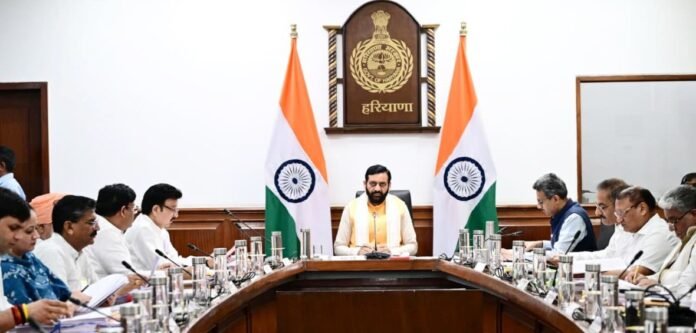Under the leadership of Chief Minister Nayab Singh Saini, today’s Haryana Cabinet meeting turned transformative with an ambitious agenda covering policy reforms, institutional restructuring, financial infrastructure, and welfare expansions.
Extensive amendments to the Women & Child Development Department’s Group B Service Rules (1997) received Cabinet approval, modernizing them to align with current administrative needs and recruitment dynamics. Key updates include renaming of posts—such as “Women & Child Development Project Officer (Female)” and “District Programme Officer (Female)”—integration of newly created positions such as District Programme Officers in Charkhi Dadri and supervisors at Paphloha’s Panjiri Plant, revisions to educational eligibility criteria and pay scales calibrated to Seventh Pay Commission norms. Recruitment reforms were also enacted: the previous requirement for dual educational streams in Project Officer recruitment—50% quota—was eliminated, and mandatory UGC‑NET criteria for direct recruitment to the Deputy Director Post have been removed. Additionally, fluency in Hindi or Sanskrit at matric level or higher has been made compulsory across all positions.
A pivotal reform was also passed to amend the Haryana Sikh Gurdwara (Management) Act, 2014, replacing Section 17(2)(c) with enhanced powers for the newly constituted Judicial Commission (under Section 46). This body will now oversee matters such as electoral disputes, member removal, and mismanagement of Gurdwara properties. The commission can act suo motu in cases of fund misuse or internal conflict, issue interim injunctions, and its orders carry the weight of civil courts. Aggrieved parties may appeal to the Punjab & Haryana High Court within 90 days—effectively further institutionalizing transparency and legal oversight in Gurdwara administration prharyana.gov.in+3babushahi.com+3haryanacmoffice.gov.in+3.
The Cabinet also granted state guarantee for ₹1,850 crore in term loans under NABARD’s NIDA infrastructure assistance scheme for Haryana International Horticulture Marketing Corporation Ltd. (HIHMCL). This funding will develop the Gannaur International Horticulture Market (IIHM) into a national hub with an estimated annual throughput of over two million metric tonnes. The project, valued at ₹3,050 crore,—with ₹800 crore equity and ₹400 crore under RIDF—aims to establish a world-class ecosystem linking farmers, processors, traders and exporters, transforming Haryana into a leading horticultural economy.
Another progressive move involved a new Easement Rights Policy to regularize access across 6-keram (10m) wide public revenue paths that bisect private plots but remain in active use. The policy permits infrastructure like subways or pipelines to connect divided plots while ensuring rights remain public, with annual fees pegged at 5% of current agricultural collector rates—payable every five years and subject to structural safety certification. It establishes clarity in land use rights while protecting public thoroughfares.
Health care reforms included amendments to the Haryana Assembly (Medical Facilities to Members) Rules, 1988, now extending a monthly medical allowance of ₹10,000 to pensioners aged 60+, aligning benefits with current standards and expanding support to family pension recipients.
Administrative modernization continued with approval of the Haryana Birth & Death Registration Rules, 2025, aligning state procedures with India’s model rules under the 2024 Central Amendment. The updated rulebook streamlines civil registration, enables digital record-keeping, and ensures conformity with national digital infrastructure efforts.
Further, guarantee limits for the Haryana Backward Classes & Economically Weaker Sections Welfare Corporation were raised from ₹25 crore to ₹35 crore to obtain concessional loans under NMDFC, aimed at self-employment of minority community beneficiaries. With an ambitious target to cover 3,000 beneficiaries in 2025–26, the Corporation continues to channel NMDFC resources at subsidized interest, having already supported over 15,100 families since inception.
Together, these six initiatives reflect a bold policy trajectory—from pensioners to rural farmers, from women’s service rules to Gurdwara administration—demonstrating the Saini government’s commitment to inclusive governance, institutional strengthening, fiscal leverage in infrastructure, legal clarity, and responsive administration. The Cabinet’s decisions promise to deliver sustainable development and expand opportunity across Haryana’s diverse sectors.




